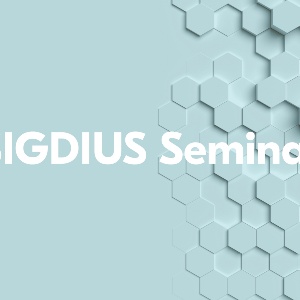| Time: | May 4, 2022, 2:00 p.m. (CEST) |
|---|---|
| Download as iCal: |
|
The Special Interest Group Data Infrastructure provides a forum for interested working groups wishing to establish or further develop an RDM infrastructure at working group or institute level. We invite you to a monthly SIGDIUS seminar, to which we invite internal and external experts for presentations and discussions. SIGDIUS members will have the opportunity to exchange their experiences with concrete RDM infrastructures.
We cordially invite all interested parties to our next meeting on 4 May 2022 at 2pm. For participation, please send an e-mail to Juergen.Pleiss@itb.uni-stuttgart.de.
This seminar will be held as an online seminar with contributions from:
Henning Hermjakob
(European Bioinformatics Institute, European Molecular Biology Laboratory (EMBL EBI), Hinxton, Cambridgeshire, UK)
Reproducibility in systems biology modelling — sometimes
In the context of the BioModels database of mathematical models of biological systems, we have systematically attempted to reproduce 455 kinetic models published in peer-reviewed research articles from 152 journals. About half (49%) of the models could not be reproduced using the information provided in the published manuscripts. With further effort, an additional 12% of the models could be reproduced either by empirical correction or support from authors. Based on these results, we have developed a simple scorecard for use by authors, editors, and reviewers to improve the reproducibility in systems biology.
Henning Hermjakob received his MSc in Bioinformatics from the University of Bielefeld, Germany, in 1996. He joined the European Bioinformatics Institute (EMBL EBI) in 1997. He leads the Molecular Networks Team at the EBI. His team provides a broad portfolio of resources for systems biology, ranging from molecular interactions (IntAct) and curated pathways (Reactome) to systems biology models (BioModels) at the highest level of abstraction. As founding member and SC member of the HUPO Proteomics Standards Initiative, current Secretary General of HUPO, and SAB member in systems and translational molecular biology projects, he contributes to the international standardisation of data representation in molecular biology and the implementation of community standards in highly available, stable public resources.
Gerasimos Chourdakis
(TU München)
Testing the multi‐component preCICE ecosystem
From artificial heart valves to nuclear reactors, multi-physics simulations involve complex software, often coupling multiple software packages, specialising in different parts of the domain. In the core of such a simulation is a coupling library, which provides numerical algorithms to transfer information between subdomains. With several language bindings, adapters, tutorials and more components in its arsenal, preCICE is now much more than a coupling library: it is a rapidly evolving multi-physics ecosystem, developed by the University of Stuttgart, the Technical University of Munich and a growing community. One small code contribution in any of the involved repositories can have side effects on the building, running and computations of any downstream component. Creating a sustainable test framework for such a complex ecosystem is not trivial. This talk will discuss the status quo of testing fully coupled simulations for regressions, the ideal system for all stakeholders involved, challenges specific to preCICE, and novel solutions that will lead us to the new preCICE system tests.
Gerasimos Chourdakis is a doctoral candidate at the Technical University of Munich, working on transforming the preCICE project from an “as-is” coupling library to a “batteries included” multi-physics ecosystem. With this perspective, he takes the leading role in organising the development and operations of the “flesh” of the preCICE ecosystem, including adapters for various solvers, tutorial cases, documentation, website, and testing, shaping these components for the preCICE community to grow upon. He is also researching methods for geometric multiscale coupling and enjoys teaching topics related to research software engineering.


